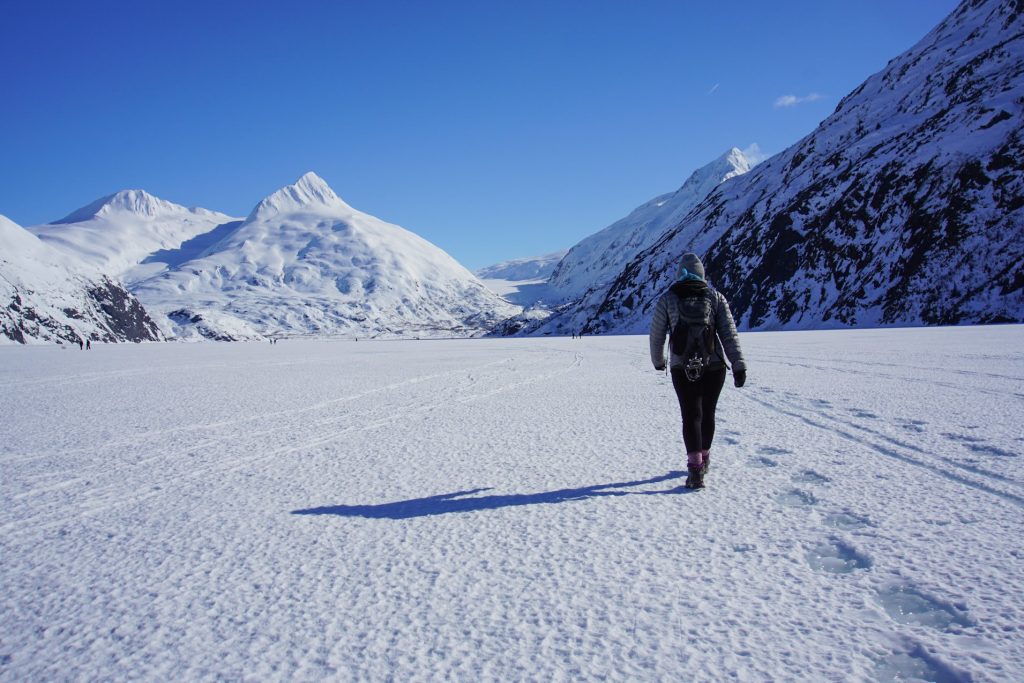Updated August 22, 2023. 21 Surprising Reasons to Visit Alaska in Winter was originally written in October 2022.
There is something truly magical when you visit Alaska in winter while everything is blanketed with snow and it feels like you’re walking in a winter wonderland.
However, I have to admit that winter in Alaska can be harsh with bone-chilling temperatures, freezing rain, and extended hours of darkness, but the only way to survive an Alaskan winter is to embrace the winter season!
Growing up in Alaska, winter was always filled with sledding down nearby hills and learning how to snowboard. As an adult, I still love playing in the snow, but I can also appreciate a cozy night sitting around the fireplace and sippin’ on a hot toddy.
From winter festivals to chasing the Northern Lights, I’m going to share the best reasons to visit Alaska in winter and the best things to do in Alaska in December, January, and February.
- What to Know About Winter in Alaska
- 21 Reasons To Visit Alaska in Winter
- 1. Winter Photography
- 2. See the Northern Lights
- 3. Fur Rondy
- 4. The Iditarod
- 5. Winter Races
- 6. Access Remote Locations
- 7. Try Winter Sports
- 8. Natural Hot Springs
- 9. Winter Resorts
- 10. Avoid the Crowds
- 11. Stunning Sunrises and Sunsets
- 12. Hike in the Snow
- 13. Experience the Darkness
- 14. No Bears and Bugs! Oh My!
- 15. Empty Roads and No Construction Zones
- 16. Winter Road Trips
- 17. Cozy Cabins
- 18. Visit Santa in the North Pole
- 19. A White Christmas
- 20. Winter Tours
- 21. Save Money
- Answering Your Questions
AndreaKuuipoAbroad.com contains affiliate links to various products, and as an Amazon Associate I earn from qualifying purchases. Read more about my Affiliate Disclosure.
Packing for a winter trip to Alaska? Here’s my Alaska Winter Packing List.
What to Know About Winter in Alaska
When is winter in Alaska?
Winter in Alaska starts in late October and ends in March. Winter solstice, the shortest day of the year, is on December 21.
How cold is Alaska in the winter?
The winter temperature in Alaska ranges from 0°F / -18°C to -30°F / -35°C from November to March. Since Alaska is so big, you will see huge differences in winter weather across the state.
How much does it snow in Alaska in winter?
Anchorage receives an average of 76.4 inches of snow per year. Valdez is one of the snowiest cities in Alaska, with an average of 325.3 inches of snow per year. In December, the average snowfall in Anchorage is 18.2 inches.

21 Reasons To Visit Alaska in Winter
1. Winter Photography
Whether you’re a professional or amateur photographer, Alaska winter will spoil you with endless photo ops of snow-covered landscapes, hoarfrost-covered trees, and dark skies full of stars and dancing Northern Lights.
A few of my favorite places near Anchorage for winter photography are Eklutna Tailrace, Eagle River Nature Center, Eklutna Lake, and South Fork Falls.
PRO TIP: Bring hand warmers in case your camera batteries get too cold!
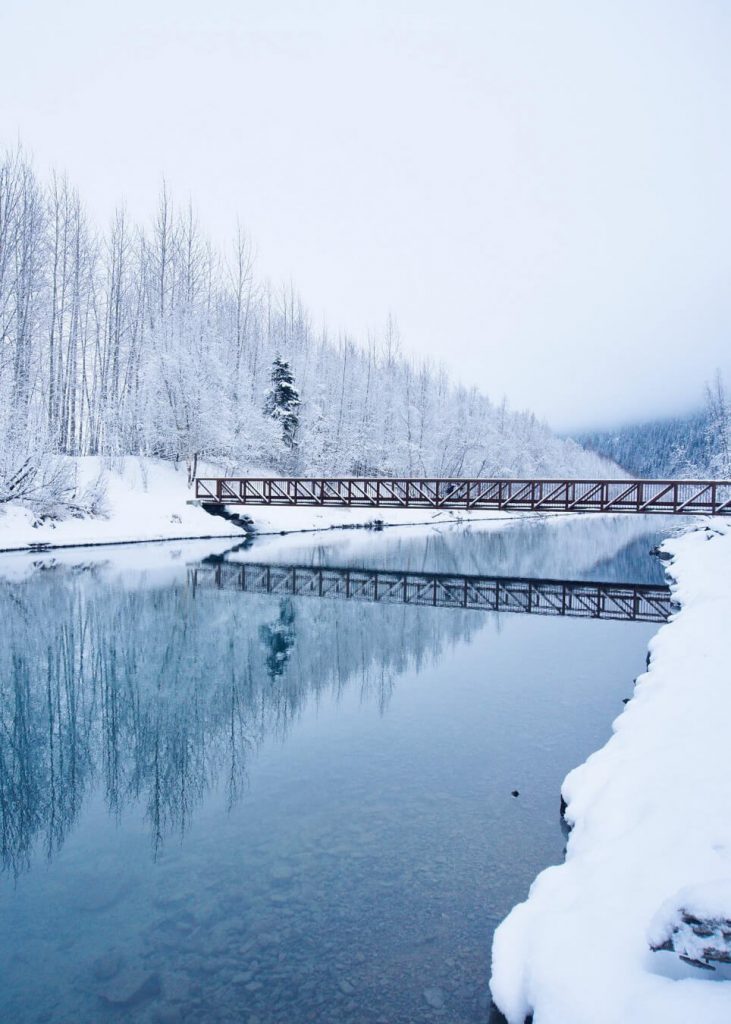
2. See the Northern Lights
I am so spoiled when it comes to seeing the Northern Lights in Alaska. I’ve seen them as early as August and I’ve even watched them from my house in Anchorage. If you want to see the aurora borealis in Alaska, you’ll want to visit between October and March. This is because the skies become darker making it easier to see the lights.
I recommend people visit in February or March because the lights are highly active during these months. March in Alaska can be a better option for those that want to enjoy milder temperatures. You can see the Northern Lights all over the state but Fairbanks is a popular destination for those who have it on their bucket list! You can even hop on the Alaska Railroad’s Aurora Winter Train for a 12-hour journey between Anchorage and Fairbanks, passing through some of the most stunning snowy landscapes.
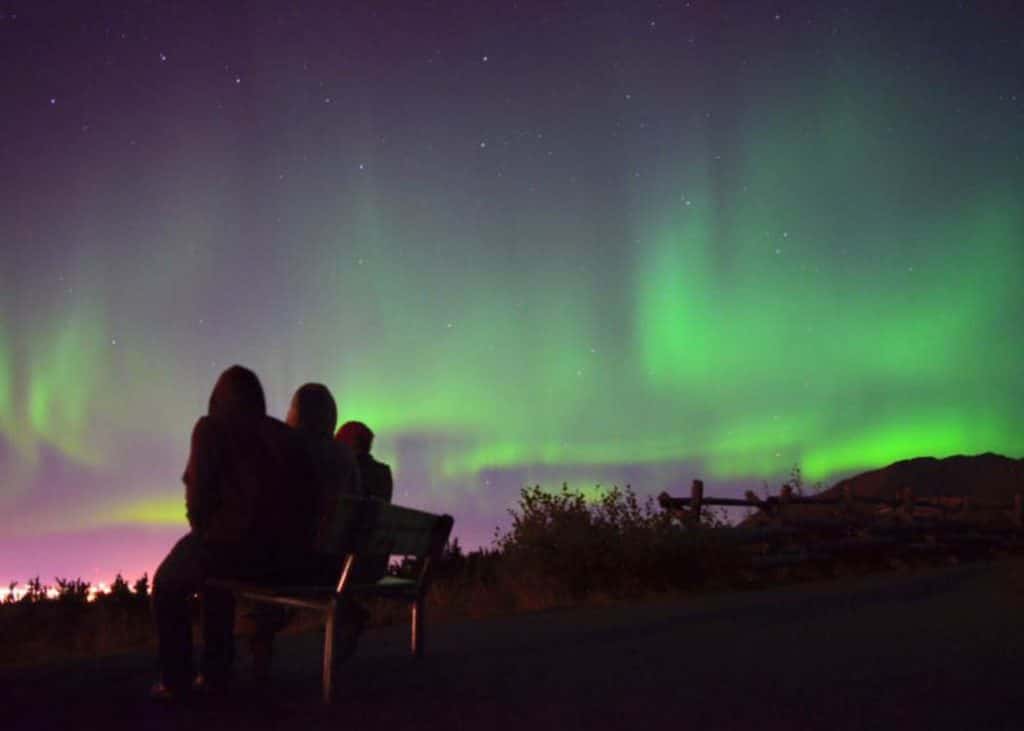
3. Fur Rondy
Alaska has a ton of fun winter events and festivals to participate in! Fur Rendezvous, known locally as Fur Rondy, is one of my favorite winter festivals in Anchorage. It’s a two-week-long celebration featuring snow sculptures, local artisans, carnival games, and crazy events like “running of the reindeer.”
The winter festival kicks off in late February, and many locals will head downtown to enjoy the activities. One of the unique events that takes place during the festival is the Fur Rondy Auction, which in previous years has included Wolf pelts, Coyote pelts, Wolverine pelts, Beaver pelts, Arctic, Red, and Cross Foxes, Muskrats, Ermine, bleached skulls, and more!
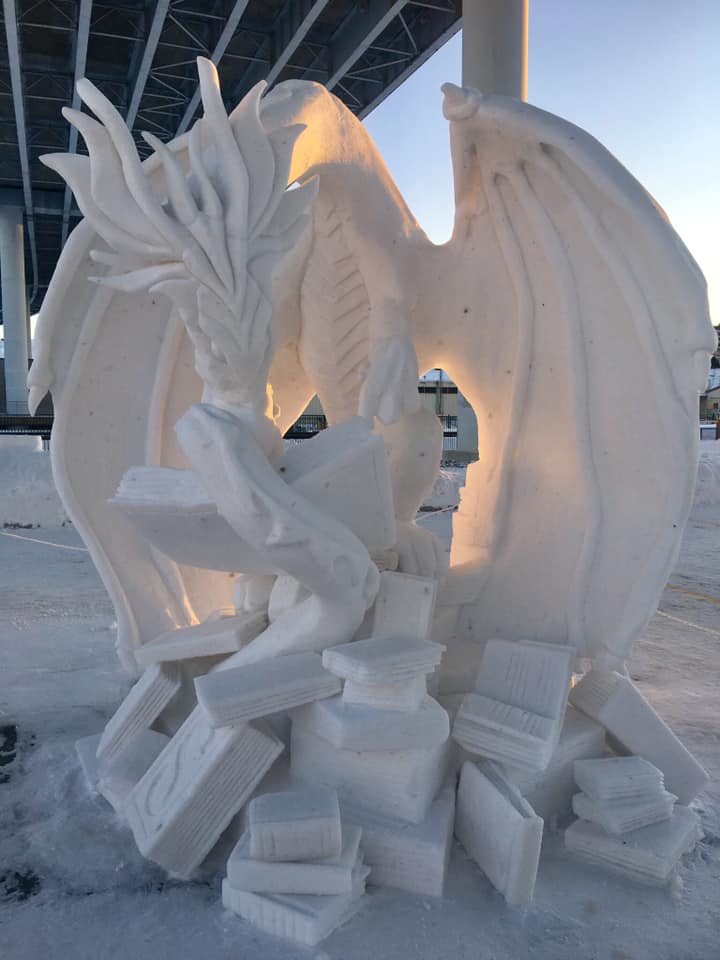
4. The Iditarod
Fur Rondy leads into the Iditarod, which is an annual long-distance sled dog race from Anchorage to Nome. Mushers will travel a distance of 1,049 miles (1,688 km) with their sled dog teams.
The Iditarod Trail Sled Dog Race dates back to 1973 and the tradition has continued every year since then. You can watch the ceremonial start in downtown Anchorage and the official start in Willow. I love watching the race from the Chester Creek Trail at a local event called, “Trailgate”.
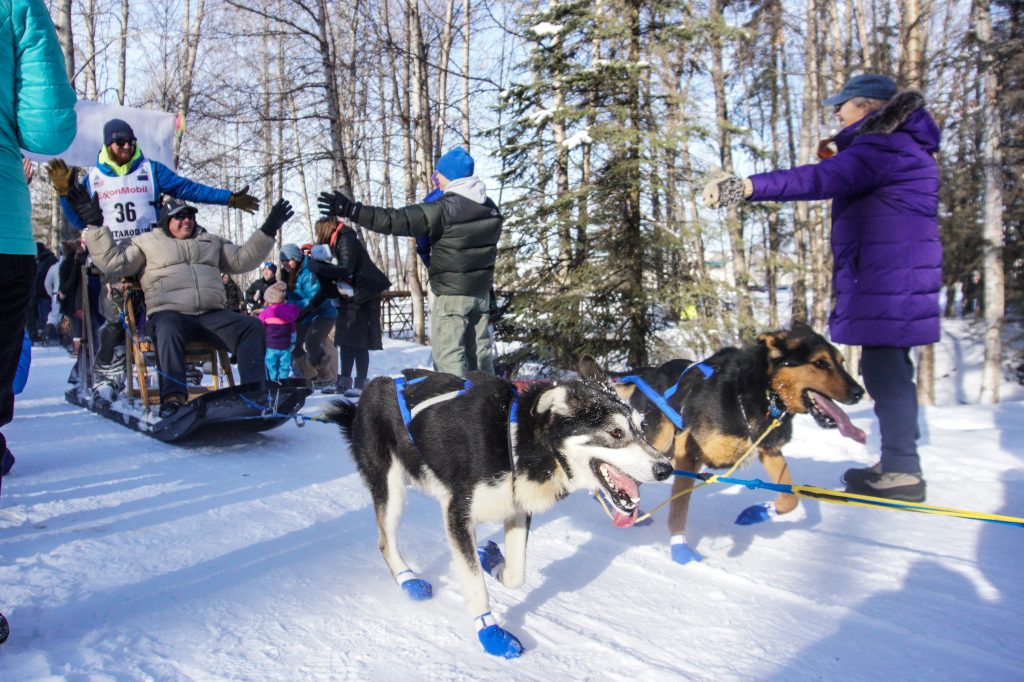
5. Winter Races
If you like outdoor sports and races, there is no shortage of them during the winter season. The Iron Dog Snowmobile Race is considered the world’s longest and toughest snowmobile race. Races traverse more than 2,500 miles across Alaska in February.
If you want to test your winter toughness, you can ski, bike, or hike the Susitna 100, which is a 100-mile extreme winter race across frozen rivers, swamps and twisty trails through the woods. The race takes place in the Susitna River Valley, north of Anchorage.
If you rather participate in a fun and laid-back race, then you might consider Oosik. This classic ski race happens in Talkeetna in March, and celebrates the end of ski season and the beginning of Spring. Skiers follow a 10, 25, or 50 km ski track, and most wear a costume while doing so.
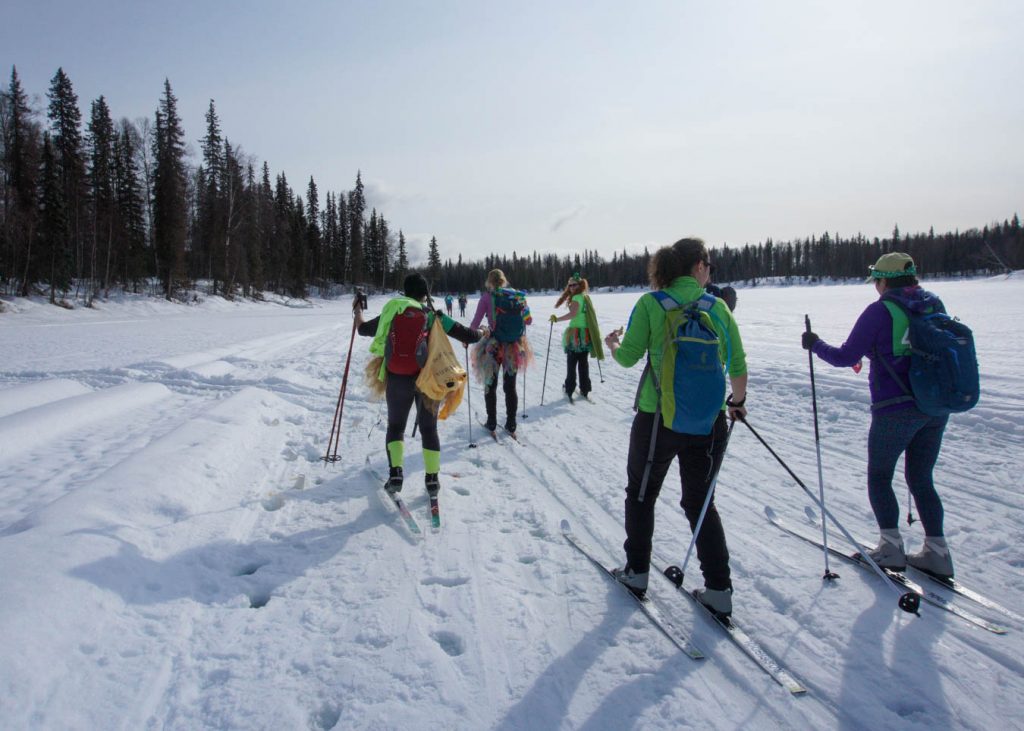
6. Access Remote Locations
One of my favorite things about wintertime in Alaska has to do with the change in the landscapes. There are some really cool places in Alaska that can only be accessed on foot or fat bike during the winter when a lake or river has frozen over.
Knik Glacier, Spencer Glacier, or Portage Glacier become much more accessible during the winter and I definitely recommend experiencing it for yourself! It’s best to visit Alaska in January, February, or March to experience some of these winter destinations.
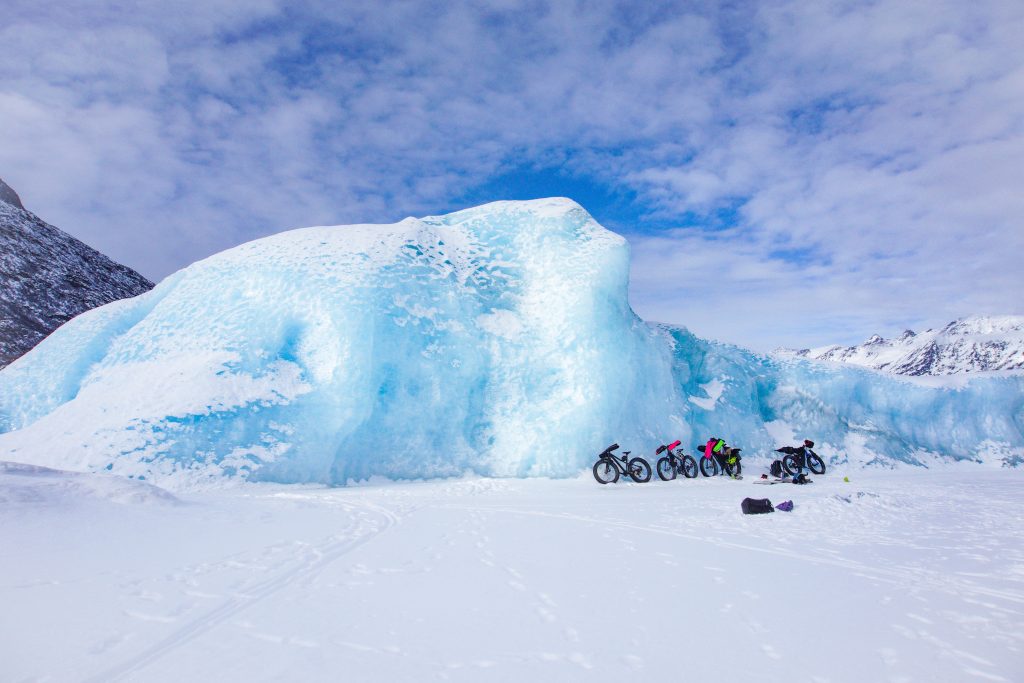
7. Try Winter Sports
I’ve already mentioned fat biking, which increases in popularity every year! It’s super fun whether you’re biking to a glacier or riding the snowy single tracks in Kincaid Park. Alaska is chock-full of winter sports to try first-hand.
You can sled in Arctic Valley, ice skate at Westchester Lagoon, ice climb Matanuska Glacier, ski in the backcountry, hike in the snow, xc ski in Government Peak Recreation Area, or spend the night winter camping in the wild. The list goes on!
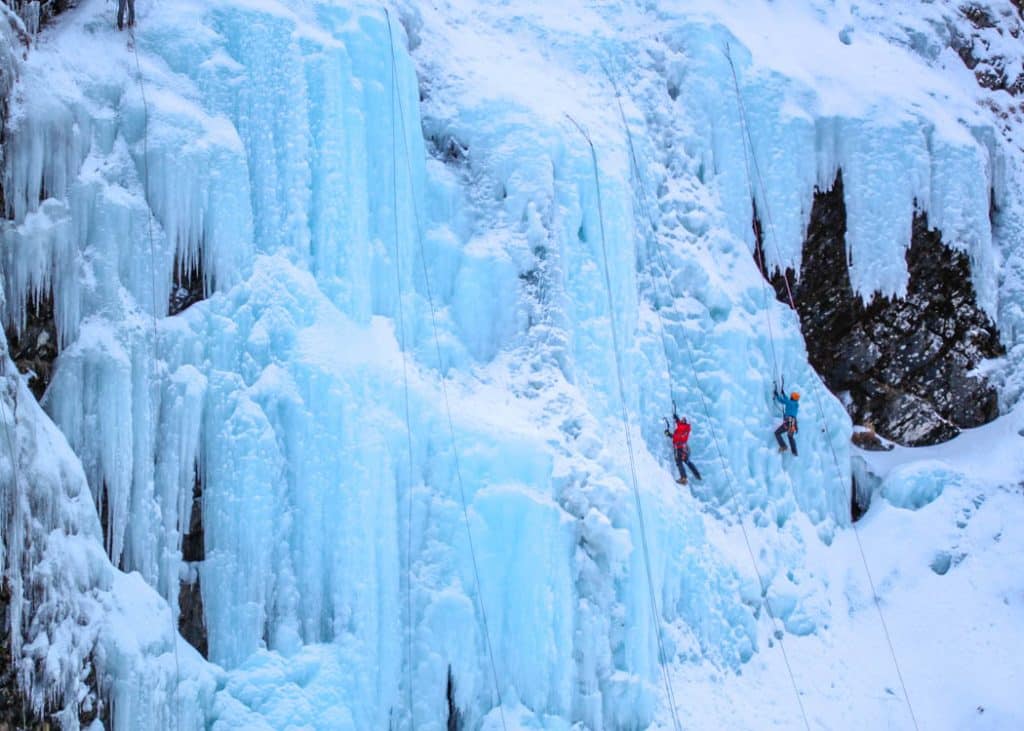
8. Natural Hot Springs
It’s hard to beat soaking in a natural hot spring while watching your hair and eyelashes turn into majestic frozen icicles. Chena Hot Springs in Fairbanks is a great spot to visit during winter and you may even see the Northern Lights while you’re there!
Tolovana Hot Spring and Manley Hot Springs are a couple of other hot spring that you can find in the Interior region of Alaska. Don’t forget to pack a swimsuit!
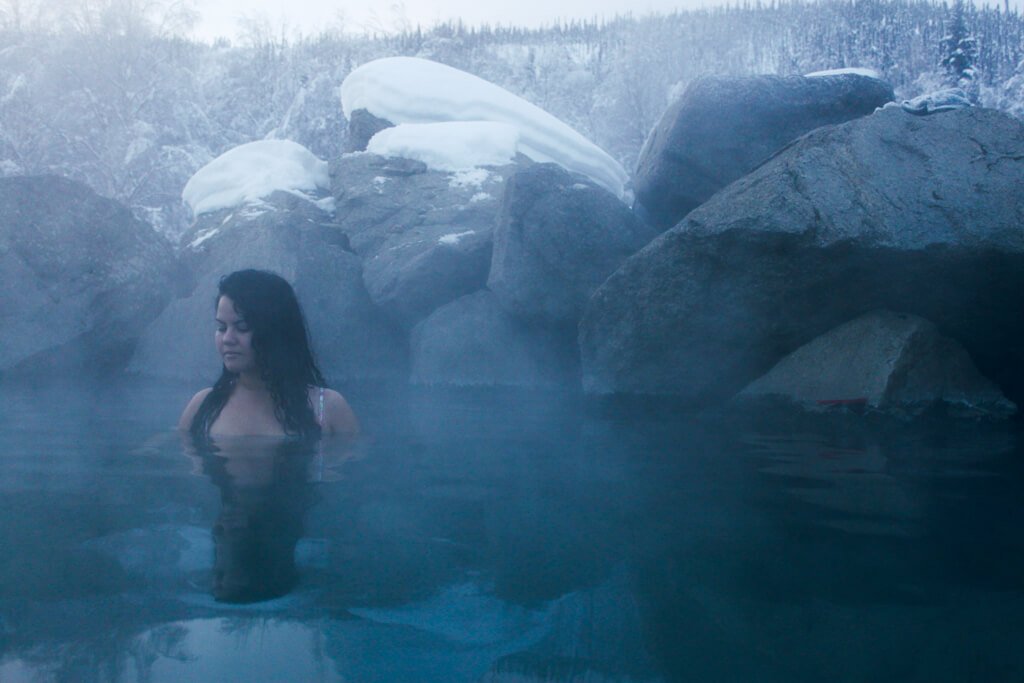
9. Winter Resorts
One of the best things to do in Alaska in winter is visit a winter resort. Alyeska Resort in Girdwood is Alaska’s largest ski area and only destination ski resort. Receiving an average of 669 inches of snow per year, it’s the perfect winter playground for all levels of skiers and snowboarders.
After a long day of skiing, you can warm up and relax at Alaska’s first Nordic Spa. There are a bunch of cold pools, hot pools, and saunas that are all situated in the rainforest right underneath the Chugach Mountains.
Want to ski for free in Alaska? If you fly with Alaska Airlines, you make be able to ski free on your day of arrival at Alyeska Resort and Eaglecrest Ski Area in Juneau. I hope they offer this again for the 23/24 winter season!
Santas also ski free! This is only offered on one day of the year, usually in December before Christmas Day.

10. Avoid the Crowds
Winter season in Alaska is typically known as being off-season which means fewer people! You’ll definitely notice the empty spaces in some of Alaska’s National Parks as visitor centers and facilities that are usually open in the summer are closed during the winter months.
During the winter, Denali National Park plows its road through Mile 2 so you can still head there to go skiing, snow-shoeing, or dog sledding.
Kenai Fjords National Park closes the road to Exit Glacier so you’ll have to hike or bike an extra eight miles to reach the glacier and public use cabins in the area. If you’re willing to put in the extra effort to reach some of these places, you’ll get to experience solitude that others won’t.
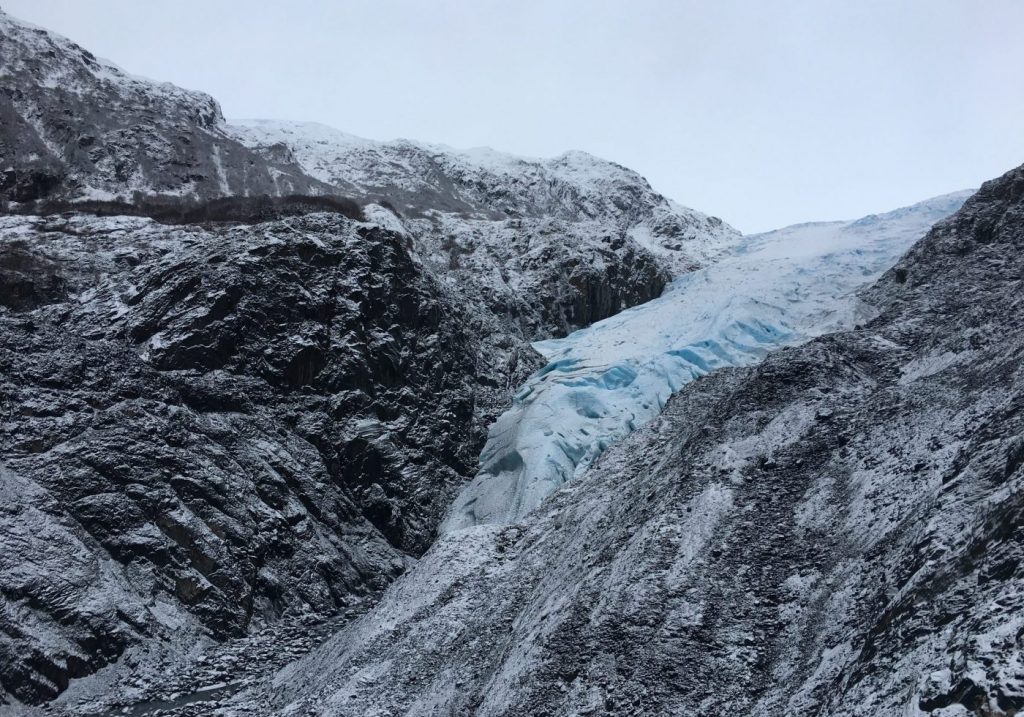
Read Next: 13 Ultimate Winter Activities in Alaska
11. Stunning Sunrises and Sunsets
As the skies get darker something magical happens in the sky. Some of the best sunsets and sunrises I’ve seen in Alaska have happened during the winter months!
Honestly, this could just be due to the fact that the sun rises way later in the day and sets well before a normal bedtime, so I’ve probably seen more of them. Can’t complain about sleeping in and still getting to see the sunrise!

12. Hike in the Snow
I love hiking in the snow! Especially after the first snowfall of the season blankets the tops of the mountains. Keep in mind that there are lots of areas that become avalanche terrain during the winter but there are still plenty of trails to hike safely in the winter.
One of my favorite winter hikes is the Winner Creek Trail in Girdwood. I love walking through the snow-covered forest!
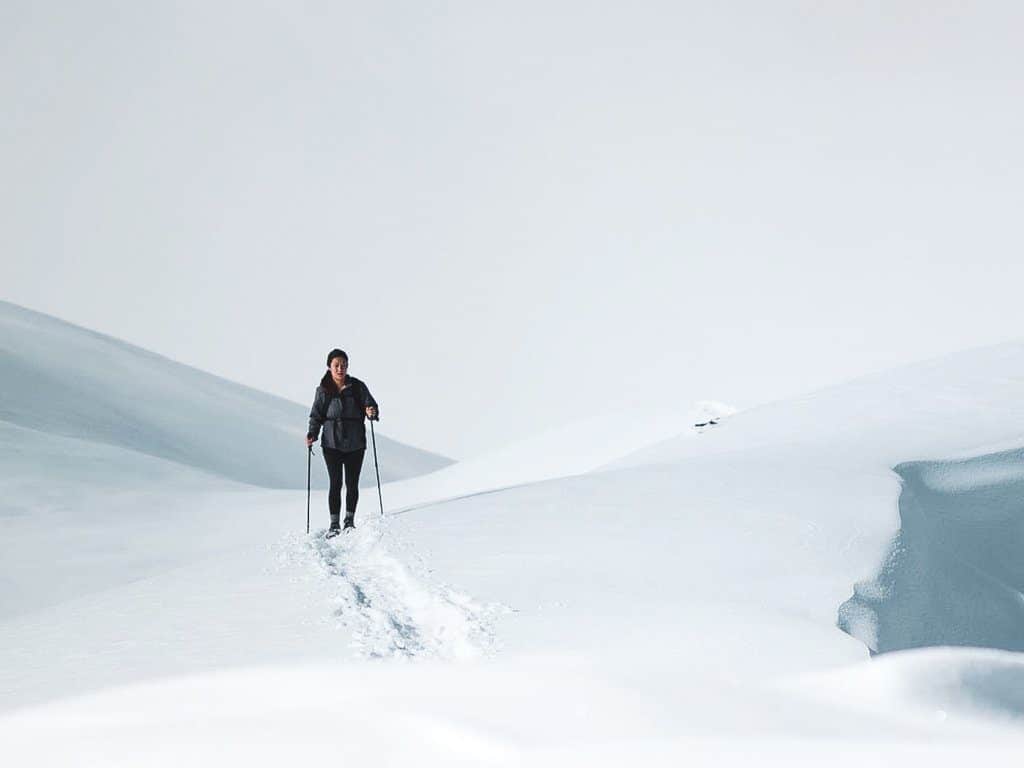
13. Experience the Darkness
Opposite the nearly 24 hours of daylight during the summer, Alaska winters are full of darkness. On the day of the winter solstice, which has the longest period of darkness, Anchorage gets only five hours of sunlight! The sun rises around 10:15 a.m. before setting at 3:45 p.m.
People who live in Utqiagvik, the northernmost town in Alaska, go for more than two months without seeing the sun rise above the horizon! It’s definitely a unique experience for anyone and a good test to see if you could actually live in Alaska. (Most people want to move here after their first Alaska vacation!)
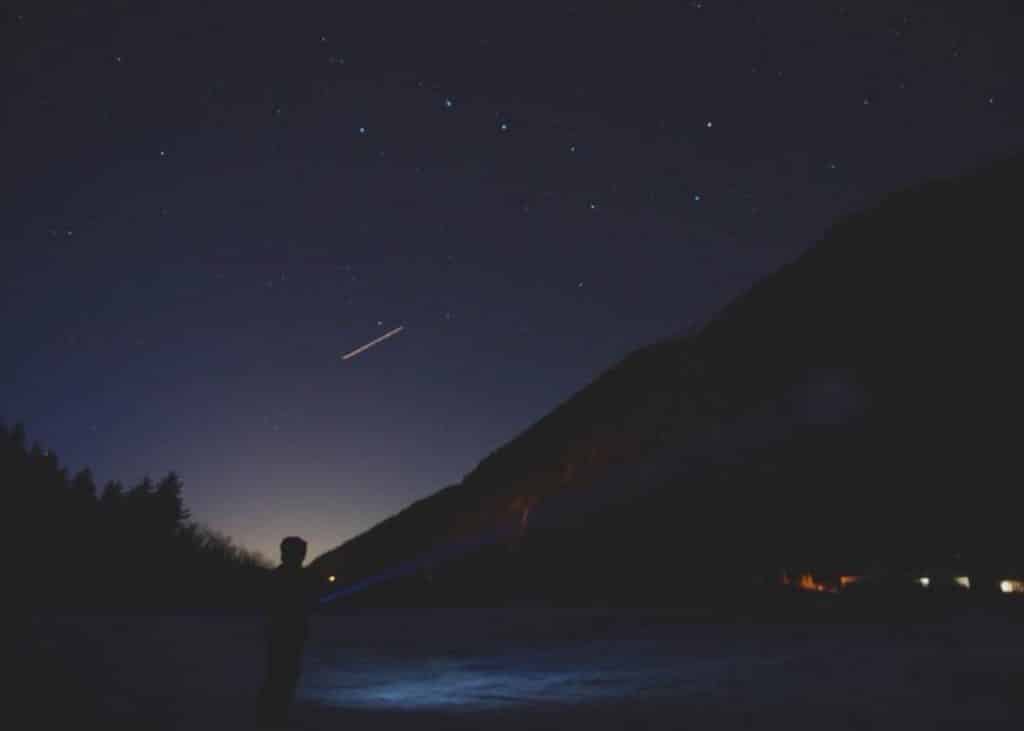
14. No Bears and Bugs! Oh My!
Okay, this one is a stretch because bears actually aren’t always hibernating all winter long, contrary to popular belief. However… your chances of running into one while exploring Alaska in the winter are pretty low!
But there are definitely no mosquitoes buzzing around in your ear or gnats biting you during the winter and this fills me with so much joy. The bugs usually start to die off in September when the temperatures start to drop.
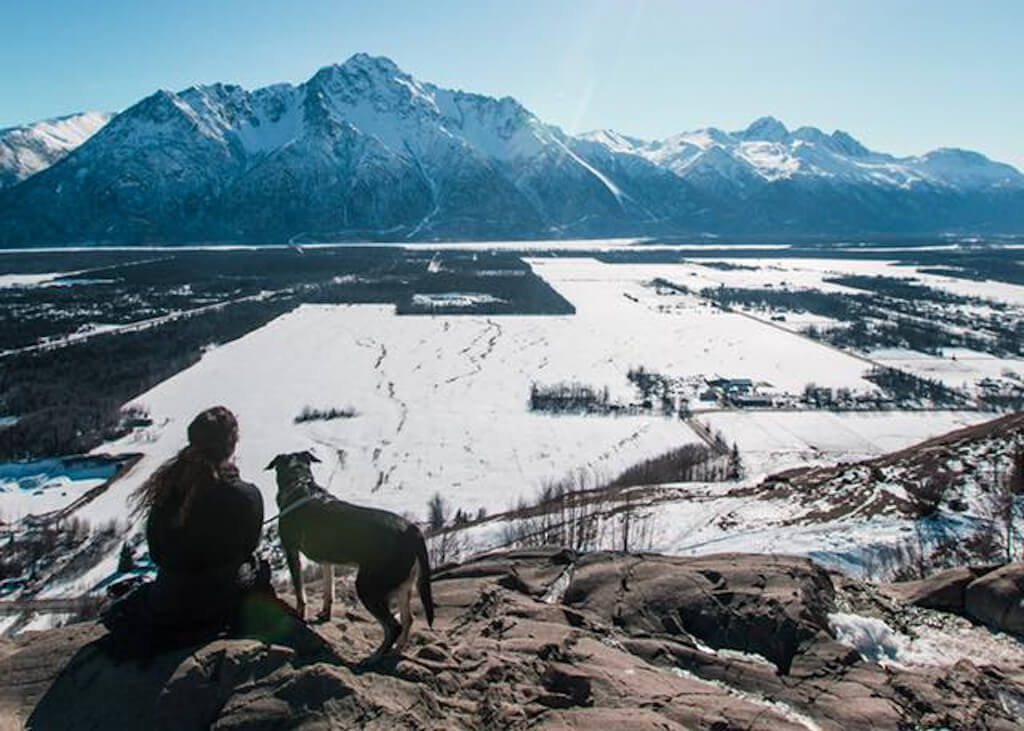
15. Empty Roads and No Construction Zones
There’s an Alaska meme about treating yourself like the Seward Highway and never stop working on yourself. It’s funny and true because there is always some sort of construction zone and traffic stops on the Seward Highway and a lot of other main roads during the summer. It makes sense why it happens during that time but it always creates a lot of backed-up traffic when every Alaskan is hitting the highway during a summer weekend.
During the winter you don’t have to worry about that! Sometimes there are a lot of accidents after the first snowfall of the year and a fresh snowfall, so you might consider avoiding driving during these times.
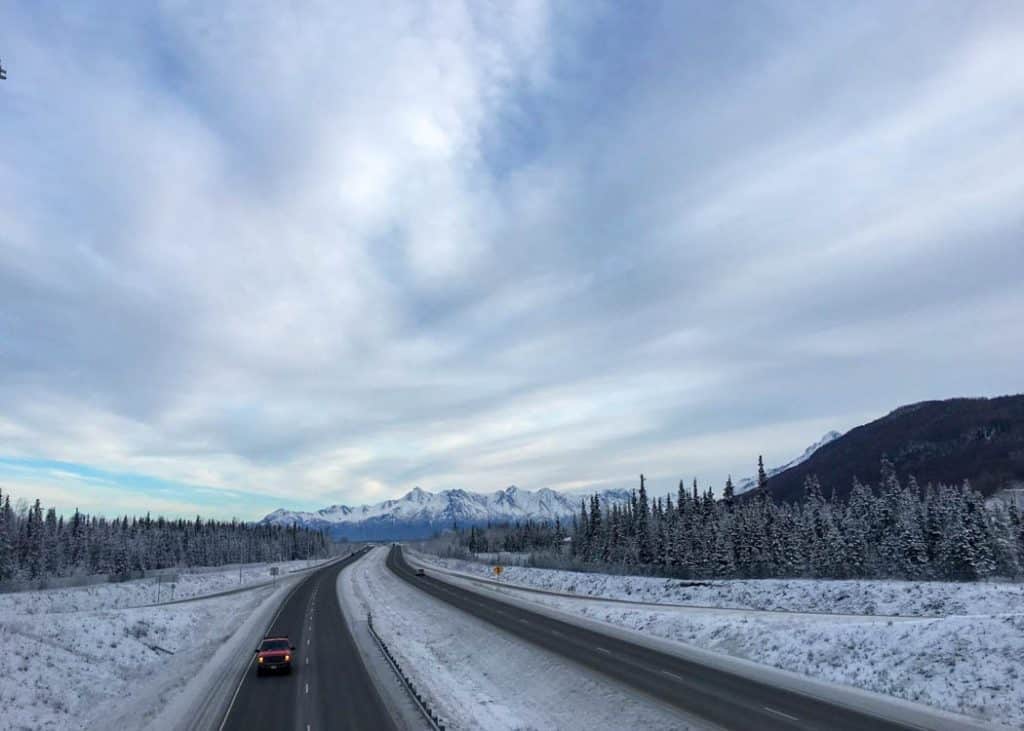
16. Winter Road Trips
Yes, you can still drive in Alaska during winter. With fewer people on the road and off-season prices for accommodations and car rentals, winter is a great time to take a road trip around Alaska. It’s best to have a vehicle with a good set of winter tires or 4-wheel-drive if you plan on driving outside of the main road system.
Some of my favorite winter road trips have been to Valdez for the Ice Climbing Festival, Talkeetna to see Denali covered in snow, and Denali National Park to winter camp and see the Northern Lights.
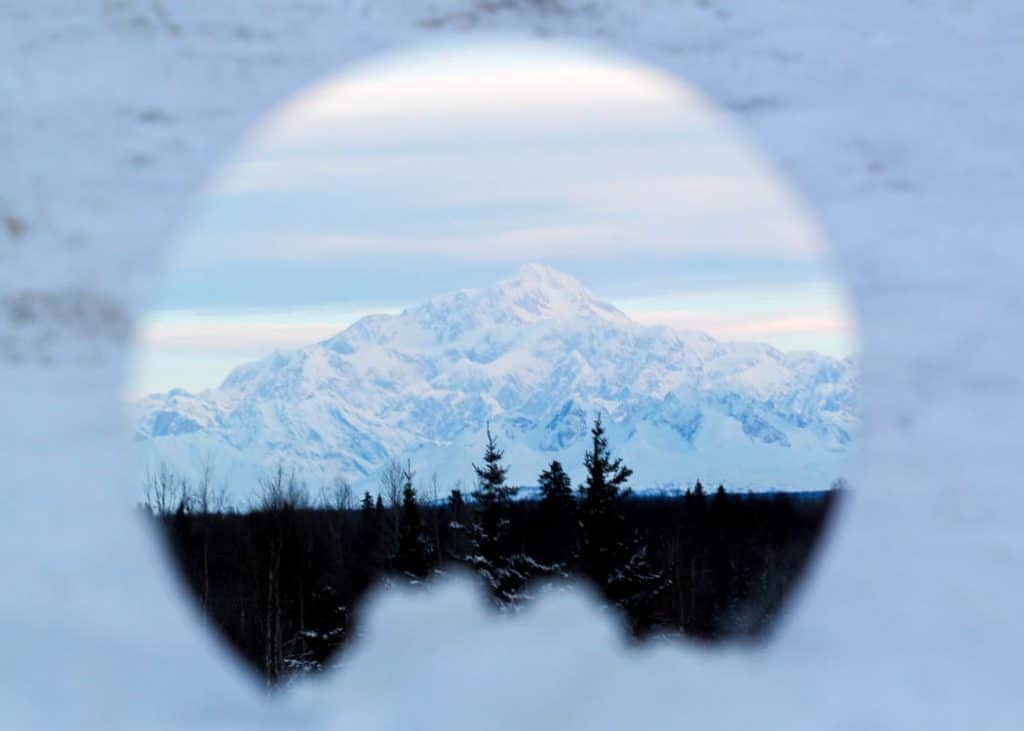
17. Cozy Cabins
Even though you can rent a cabin year-round in Alaska, staying in a cabin during the winter brings that extra cozy factor. After a perfect day of frolicking around in the snow, you get to come back to a cozy cabin.
As the fireplace starts to roar, you slip into your pajamas and settle into that new book you’ve been waiting to read. Add a glass of wine and the snow falling outside your window to really complete the perfect cabin stay.
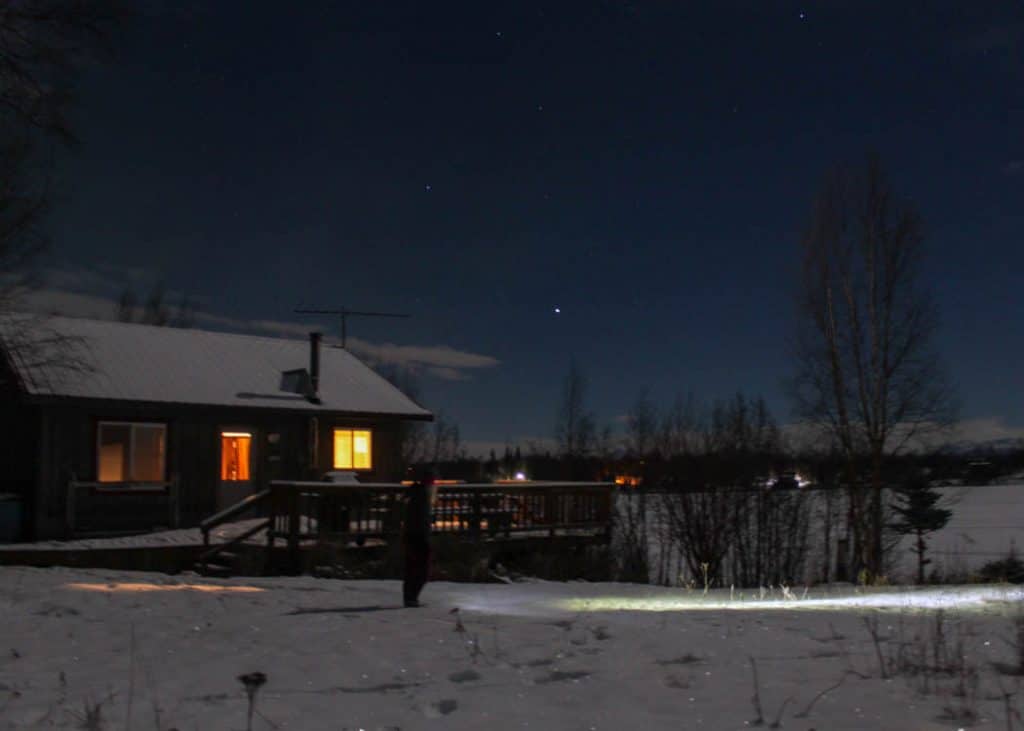
18. Visit Santa in the North Pole
Did you know that Alaska has a town called North Pole? If you plan to visit Fairbanks in winter, you have to make a stop here. North Pole is known for having year-round Christmas decorations.
You can actually visit the Santa Claus House, take a photo with a 42-foot-tall Santa, or send a postcard from the North Pole. This is a fun destination for families traveling to Alaska in winter.

19. A White Christmas
Speaking of Christmas.. If you have been dreaming of a white Christmas then Alaska is the perfect winter destination for you. In December, the state is covered in snow, and there are plenty of festive events to enjoy, from art and craft fairs and bazaars to tree lighting ceremonies.
One of the newest holiday events is Bright Up the Night. It’s the largest drive-through holiday light display in the state. You drive your own vehicle for nearly a mile across the Alaska State Fair Grounds to see more than 70 amazing light displays. The displays are coordinated to music that you can tune into on your car radio. The event runs from Thanksgiving Day to New Year’s Eve.
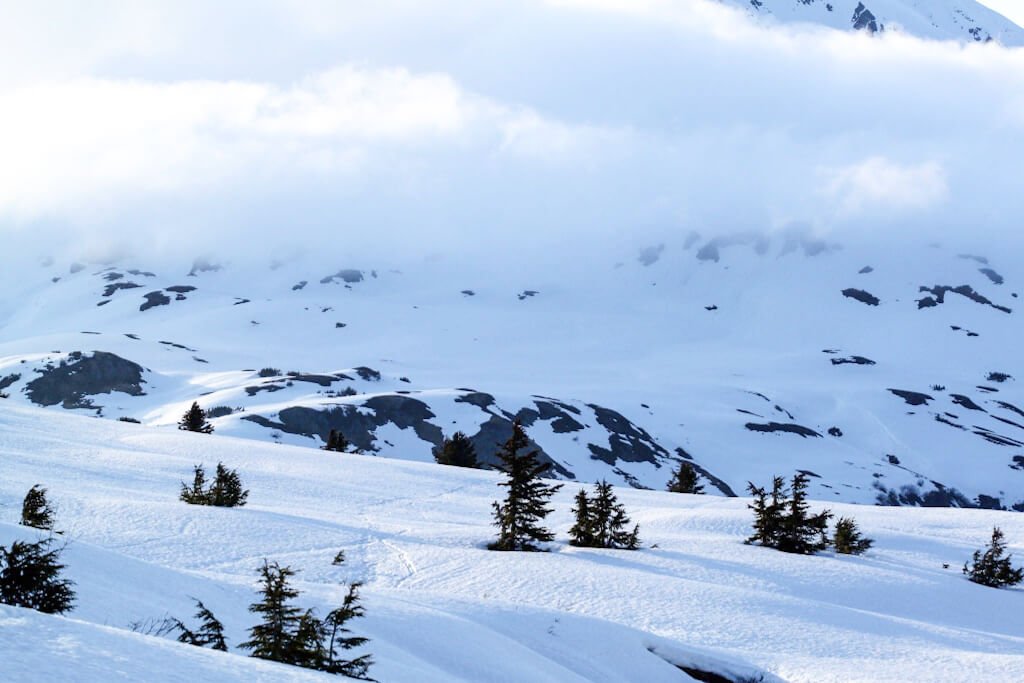
20. Winter Tours
Alaska offers a lot of options when it comes to winter tours. The most popular tours to book during winter surround aurora viewing. It can be helpful to have an experienced guide or photographer with you for your best chances of seeing the Northern Lights.
Another popular winter tour is dog sledding. During this dogsledding and mushing experience in Fairbanks, you’ll be towed by sled dogs down five miles of snowy trails.
Flightseeing is also an incredible tour to do in winter in Alaska. Whether you are on a plane or a helicopter, seeing the snowy mountains and landscapes from above is spectacular.
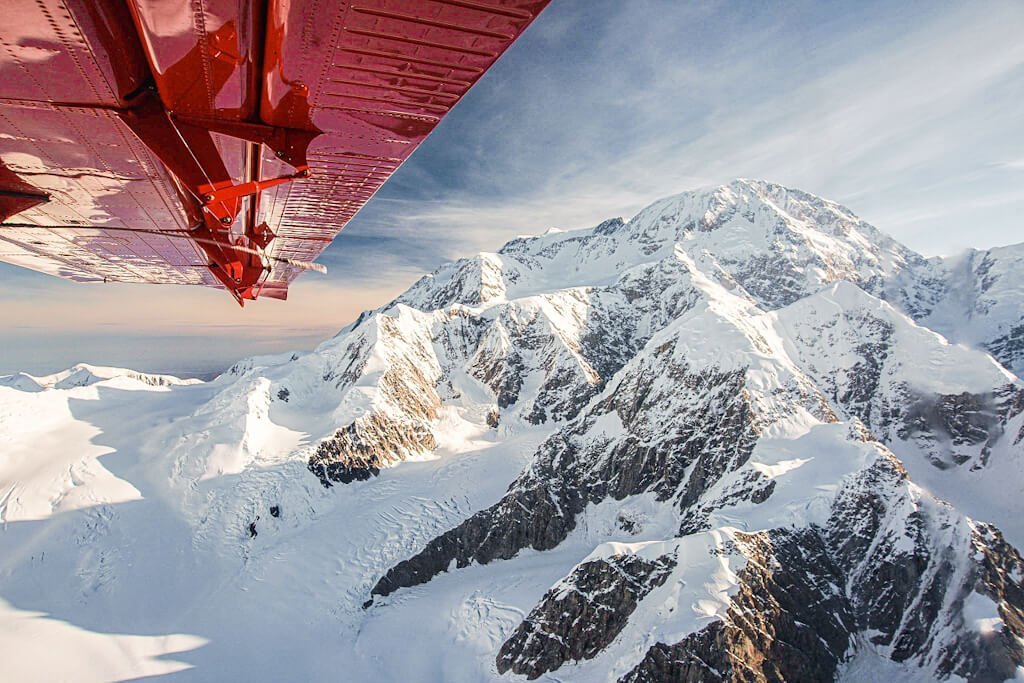
21. Save Money
The last reason to visit Alaska in winter is that you’ll save money! Woohoo! Since winter tourism is not as busy as summer tourism, you can actually find some amazing deals on activities. You can also get around 50% off summer rates for lodging, which is a huge money saver.
Spending time to enjoy the outdoors in winter is free, but if you want to do some outdoor activities you’ll find there are lots of shops to rent gear and equipment from.
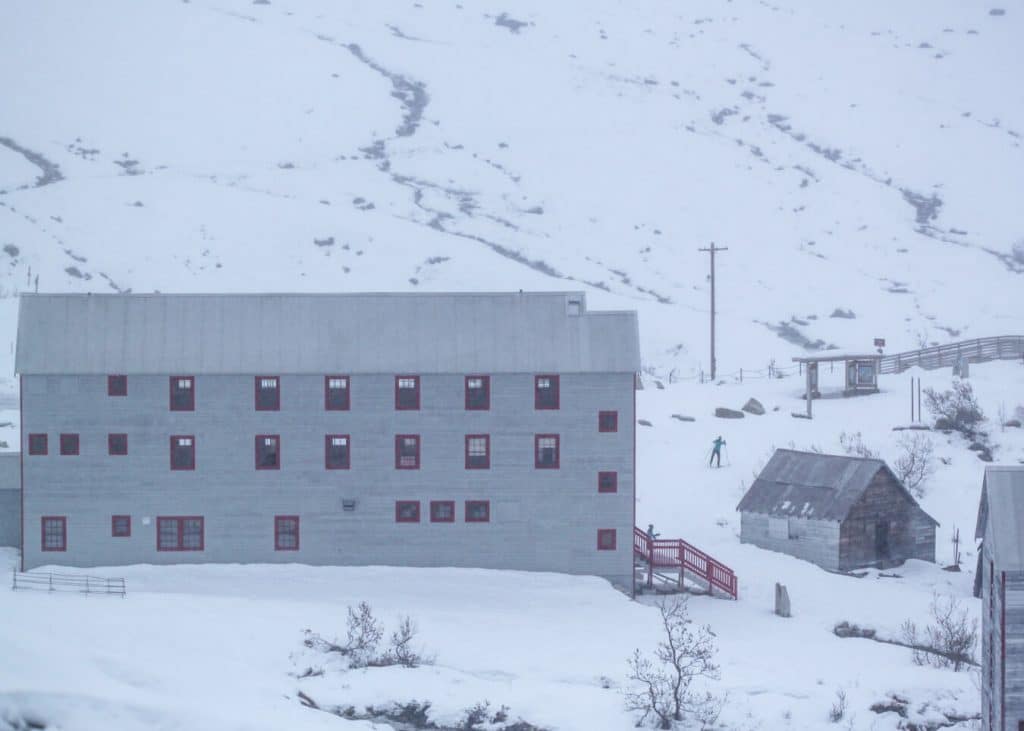
Happy winter travels!
Answering Your Questions
Is it worth visiting Alaska in the winter?
Alaska is the perfect winter destination if you want to see snow and the aurora borealis.
What is Alaska like in the winter?
Alaska in the winter is a winter wonderland and each month has someting different to offer.
Is it worth visiting Alaska in December?
December in Alaska is a great time to visit since there are a lot of fun seasonal festivals and events.
Is it safe to drive to Alaska in the winter?
Driving in Alaska in the winter can be challenging due to snow and icy roads. Drive slower than normal to increase safe driving.
Read More
What to Wear Hiking in Alaska (Winter)
Top 10 Things To Do In Fairbanks in Winter
Pin For Later
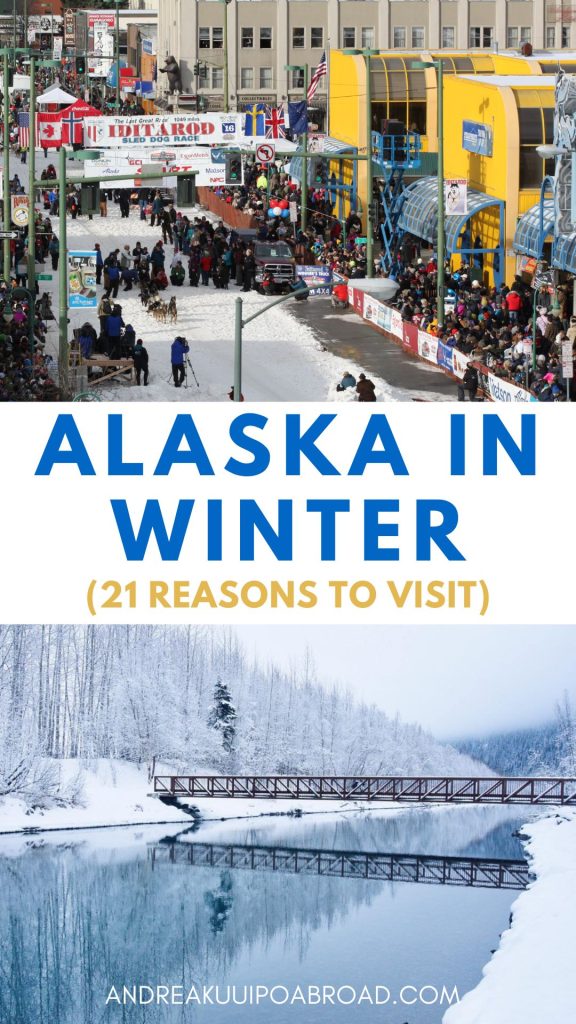
Do you have any questions on reasons to visit Alaska in winter? Let me know in the comments.

